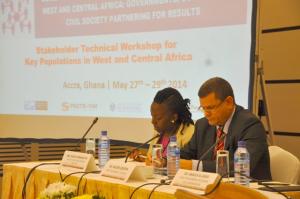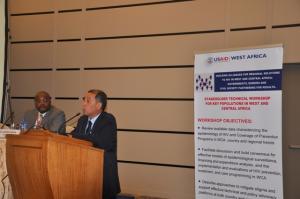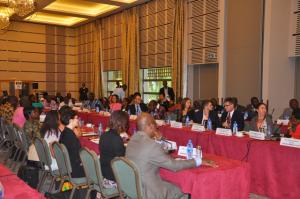WAHO Calls for Stronger Alliances to Boost Results Oriented HIV Programming Among Key Populations.
Available data show the need to shift from individual risks based HIV interventions to those which characterize key populations living with HIV/AIDS.
Many challenges still militate against preventing new infections and reducing the number of AIDS related deaths in our region"
ACCRA, GREATER ACCRA, GHANA, May 29, 2014 /EINPresswire.com/ -- 29 May 2014, Accra, Ghana. — Dr. Crespin Xavier
A three-day technical workshop targeting regional partners on HIV programming with special emphasis on key populations in West and Central Africa ended here.
Organized under the auspices of the USAID-West Africa in collaboration with John Hopkins University, Family Health International and the Futures Group, the technical workshop set out to serve as a platform to mobilize and coordinate efforts in West and Central African regions by facilitating collaboration among the donor community, implementers, civil societies on HIV key populations programming.
In attendance were participants from, Cote d’Ivoire, Cameroon, Senegal, Togo, Burkina Faso, Ghana, Benin, Nigeria, Liberia and Gambia.
Other invitees included USG, Global Fund, World Bank, UNAIDS/JURTA, Ministries of Health, AIDS Control Committees, Ouagadougou Partnership, WAHO, WHO, HIV/AIDS Alliance and the Civil Society.
In his keynote address, WAHO Director-General, Dr. Crespin Xavier urged stakeholders to strengthen collaboration and better coordinate their efforts with a view to guaranteeing an efficient and result oriented HIV programming for the benefit of key populations.
“ While considerable progress have been made in preventing new infections and reducing the number of AIDS related deaths, many challenges remain and commitments of Heads of Governments continue to be undermined in achieving the Millennium Development Goals” he concluded
Earlier, the USAID-West Africa Acting Regional Health Office Director, Mrs. Daniele Nyirandutiye told participants that between 2007 and 2011, access to medical treatment in Ghana and Burkina Faso and Togo reduced HIV incidence among adults by more than 50 percent.
She however cautioned that while new HIV infections among the general populations in Sub-Saharan Africa appear to be on the decline, available data from different studies show that HIV prevalence among key populations in the region is between 3 to 30 times higher than other populations of reproductive age.
“Now is an exciting time for us to understand how to operationalize available comprehensive package of services proven to be effective for the benefit of key populations. The focus in programming has now shifted from individual risks to those characterising people living with HIV/AIDS” she concluded.
Mrs. Nyirandutiye called for the removal of obstacles such as stigma, national laws, protocols and directives prohibiting access to treatment by key populations. The workshop featured presentations, country highlights and panel discussions.
Kayode Egbeleye
West African Health Organisation
+226-66236648
email us here
Legal Disclaimer:
EIN Presswire provides this news content "as is" without warranty of any kind. We do not accept any responsibility or liability for the accuracy, content, images, videos, licenses, completeness, legality, or reliability of the information contained in this article. If you have any complaints or copyright issues related to this article, kindly contact the author above.



